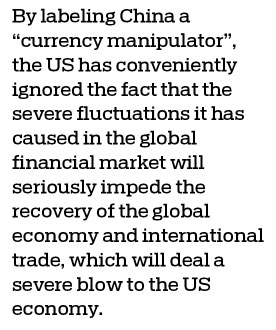Tariffs more harmful to US economy
Prior to the 12th round of Sino-US trade talks in Shanghai on July 30-31, many hoped the Chinese and US negotiators would put the Sino-US trade negotiation process back on the right track. In fact, after the conclusion of the talks, the two sides termed it "constructive", and agreed to hold the next round of negotiations in Washington in September. And almost everyone interpreted it as a sign of easing of trade tensions between the United States and China.
But the US made an about turn, threatening to impose 10 percent tariffs on another $300 billion worth of Chinese goods starting Sept 1. As if that was not enough to further raise tensions, on Aug 6, the US Department of Treasury labeled China a "currency manipulator" dealing another serious blow to bilateral ties and causing turbulence in the financial market. The US' contradictory behavior makes it important for China as well as the international community to double their efforts to ensure trade frictions are resolved through negotiations.

After the 11th round of trade talks ended inconclusively, the US trade representative solicited domestic opinions on Washington levying tariffs on $300 billion of Chinese products. But a majority of the US enterprises opposed this idea. Also, about 53 percent of US citizens oppose Washington's tariff policy, as higher tariffs on Chinese imports would raise commodity prices in the US and thus make their everyday life more troublesome.















